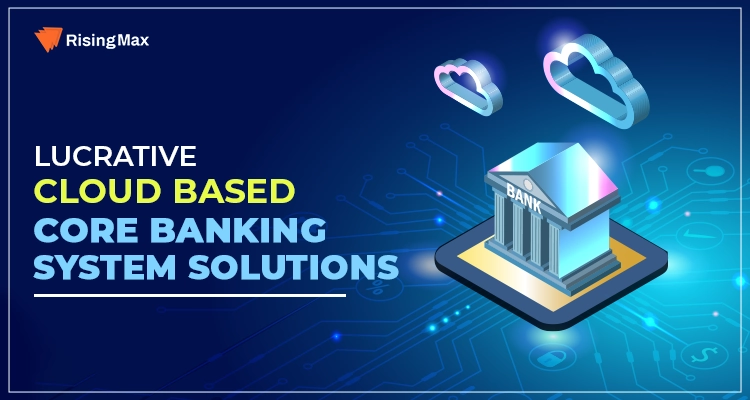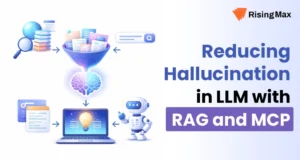Cloud computing has evolved from a cutting-edge technology to a mainstream one over time. Banks should immediately capitalize on the many advantages of running their core banking systems in the cloud. When designing solutions for banks, timing is crucial. While a solution’s quality significantly impacts its strategic success, timing can be just as crucial.

The global banking sector is gradually becoming aware of this changing dynamic as more and more industries adopt a cloud-native architecture. This is demonstrated by the discussion of moving from a legacy to a cloud based core banking system, which is currently the top strategy at the world’s largest banking institutions.
RisingMax’s cloud based core banking system solution efficiently supports a bank’s entire range of business activities, including front office, operational workflow, back office, and accounting.
The banks of the future will not resemble the ones we know today at all. This blog post will examine how core banking systems based on the cloud are redefining the future.
Driving Your Core Banking Experience
Since it affects the entire bank and its operations, implementing core banking is a crucial decision point for banks. A project’s success directly impacts profitability, customer satisfaction, and competitiveness. An end-to-end cloud based core banking system solution gives banks greater power by automating all the essential functions, such as providing accurate accounting services, fulfilling compliance mandates, and producing management information for efficient decision-making.
This allows them to adapt to the constantly shifting customer expectations in the fiercely competitive and rapidly evolving fintech sector. Typical cloud banking service models include the following:
- Business Process-as-a-Service (BPaaS) – covers just a few typical business processes, such as billing and human resources.
- Infrastructure-as-a-Service (IaaS) — delivers a full-featured core banking infrastructure that manages business operations and software integrations
- Software-as-a-Service (SaaS) — delivers cloud-based banking applications such as customer relationship management, billing, and accounting.
- Platform-as-a-Service (PaaS) — provides a core banking platform in the cloud to create apps and databases.
Also Read: Cloud Security Consulting Services
Why Move Toward Cloud Based Core Banking System?
Beyond the obvious advantages of cost savings, scalability, and rapid deployment, a cloud-native architecture offers greater agility, allowing a bank to accomplish previously impossible tasks. Many banks collaborate with third parties to meet customer needs and advance the cause despite the burden of legacy systems.
Core banking in the cloud enables banks to depart from a model in which all technology is housed in a single location (the bank’s data center) and in which APIs immediately impact data movement between various parties.
To convince people that moving core banking to the cloud is a good idea, you should emphasize the short- and long-term gains financial institutions can expect from moving their core banking infrastructure.
Infrastructure Savings
Cloud computing eliminates the high infrastructure cost because organizations do not have to maintain their own data centers. Customers benefit from a subscription-based approach with a public cloud pay-as-you-go model, offloading all infrastructure support and maintenance duties to the cloud provider. This kind of assistance enables Institutions to free up resources that would otherwise be used to maintain their data centers.
On-Demand Scaling & Agility
To guarantee uptime during times of high demand (like the holidays), institutions frequently pay more for off-peak time periods throughout the year. Capacity is frequently calculated based on coverage for peak periods. In the past, core banking institutions were charged based on the million instructions per second (MIPS) mainframe capacity calculation, which is still used today.
In contrast, cloud-based services are flexible and simple to scale up (or down) as needed to meet the computing requirements of organizations. Businesses with this agility level may enjoy a cost advantage over rivals who run and maintain their own data centers.
Security & Availability
Information resilience and privacy are two crucial security areas where the public cloud excels. The idea of resilience is to avoid losing data or allowing it to become corrupt. Identity and Access Management services offered by cloud vendors enable businesses to impose granular controls on what can be done with data in a cloud environment.
When these security and audit controls are combined with active organizational directories or other authentication platforms, penetration attacks that would otherwise require significant investments to implement in an on-premise environment can be audited and reduce their surface area.
Future Workforce Ready
COBOL or other languages akin to it are used to code the majority of mainframe applications. They have gradually been phased out of computer science curricula in colleges and universities nationwide and abroad over the past 20 years.
As a result, mainframe technologies are seen as a dying platform that has long since passed its prime. Recent graduates are more knowledgeable about architectural principles and more modern languages, which are the foundation of cloud computing.
Migrating technical assets to the cloud becomes a no-brainer when considering a future workforce. Cloud providers have significantly invested in spreading knowledge and understanding of systems (like AWS certifications).
Align the current state of IT with your business strategy by hiring the most trustworthy Cloud-Based Core Banking Development Company
Benefits Of Cloud Based Core Banking System Sector
Using cloud based core banking system has advantages such as lower costs, greater IT adaptability, and quicker time to solution. Here are a few additional benefits to consider.
Institutional Collaboration
One benefit of cloud based core banking system is that it gives financial institutions access to their customers’ entire financial picture, which enables them to analyze risk and provide the best credit terms by learning specifics about their financial situation. In addition, before making any financial decisions, it helps the client get a better understanding of their financial situation.
Alternative Payment Modes
Since most traditional banks cannot process transactions as quickly as customers like alternative payment processing systems have emerged. Cloud banking supports fintech by creating open-source payment software to advance efficiency and dependability.
Advanced Processing Ability
Cloud based core banking system offers more processing power. It uses a network of servers and processors to enable subscribers to increase their processing power easily. Because cloud-native architectures are intentionally designed for scalability, this is possible.
Institutions that subscribe can easily change their processing capacities to meet shifting business demands. It makes sure everything runs smoothly and improves the customer experience.
Lower Operation Cost
By utilizing the cloud, banks reduce their hardware costs by eliminating the need to own software infrastructure. Banks can save money by switching from legacy systems to cloud-based platforms, which eliminates the need for server development and maintenance overhead. An improved customer banking experience is the end result, driven by cost-effectiveness and increased operational agility.
Broader Customer Reach
With the scalability of a cloud environment, customers can take advantage of on-the-go banking services whenever and wherever they want. Banks can expand their services globally and support transactions over great distances with the cloud’s promise of seamless coordination. Additionally, FIs can gather user data from cloud environments to learn more about their customers’ payment habits, creditworthiness, and other characteristics.
Faster Time-to-Market
The benefit of cloud based core banking system is that new solutions can be implemented almost instantly. As a result, FIs no longer need to spend as much time upgrading their systems. In some instances, FIs can complete system updates in a matter of hours rather than days.
In the past, FIs had to develop unique features on their own to provide interoperability with business partners. IT support and data exchanges become more immediate with this API-enabled integration.
Why Choose The Core Banking Software Solution By RisingMax Inc.?
With more than 6 years of experience building fintech platforms and creating payment solutions, RisingMax Inc.’s cloud based core banking system solutions offer expertise and innovation while utilizing modern cutting-edge technology.
The cloud based core banking solution strongly influences the functionality and adaptability of your digital bank. You should therefore be careful when selecting the on-premise bank solution provider.
Well-Versed Company
We have over 13 years of industry experience, including the fintech sector, and are experts with first-hand knowledge of what it takes to create practical payment solutions.
Time-Saving Approach
Using ready-to-use core banking software solutions with source code for payment systems, neobanks, money transfers, currency exchange services, e-wallets, accepting online and in-store payments, and other payment-related services can save you up to a year for banking and financial software development.
Adaptive Innovation To Change Landscape
We use cutting-edge technology to develop payment systems that satisfy contemporary needs, maintain your competitiveness, and provide original answers to fintech problems.

Cloud-Based Core Solutions To Accelerate The Future Of Banking
Due to their lack of innovation, scalability, and agility, legacy core banking systems pose numerous difficulties to incumbent banks. They are created using antiquated technology. This also discourages banks from pursuing their agenda for business transformation. Additionally, cloud based core banking system solutions are making it simpler for non-financial companies to launch banks and new service offerings, calling into question the usefulness of legacy activities in traditional banking.
US businesses typically see a 30% ROI on cloud investments and increased market share, revenue, profitability, and risk management. As a result, large banks are assessing their core banking platforms and carefully observing market trends to start the core banking modernization process.
You might also be interested in Innovation. Digital Banking. Neobanks. Fintech Solutions. Open Banking. Don’t worry; we got your back!!! Contact our experts and get all the financial solutions.














